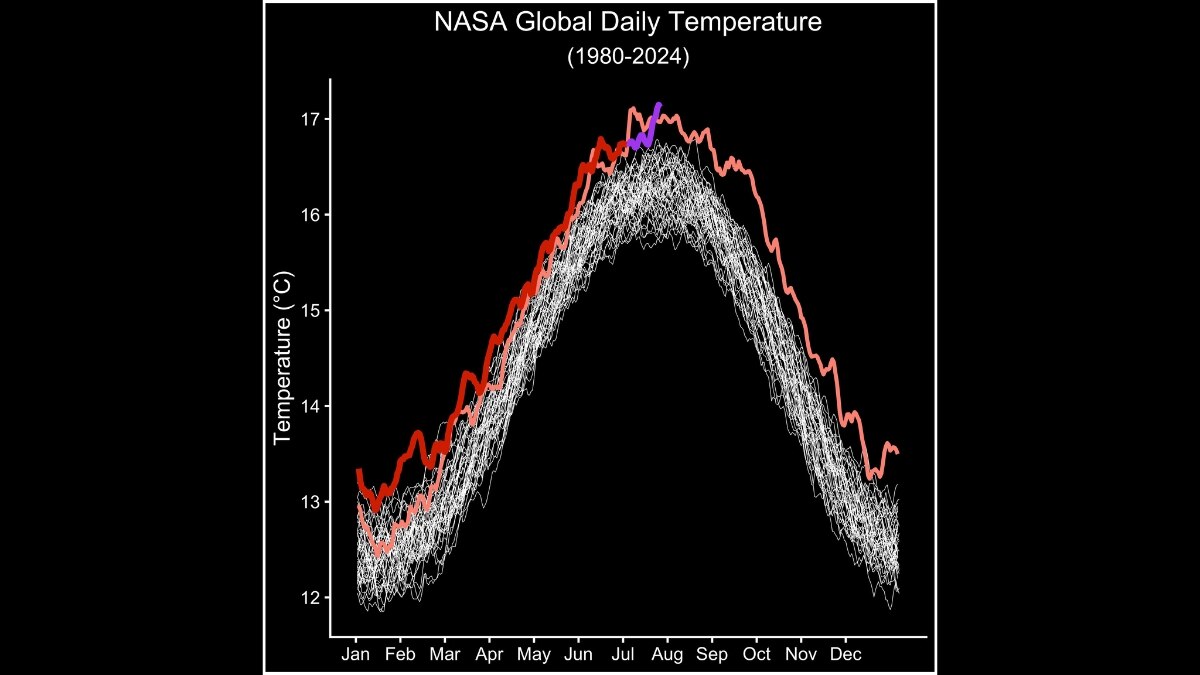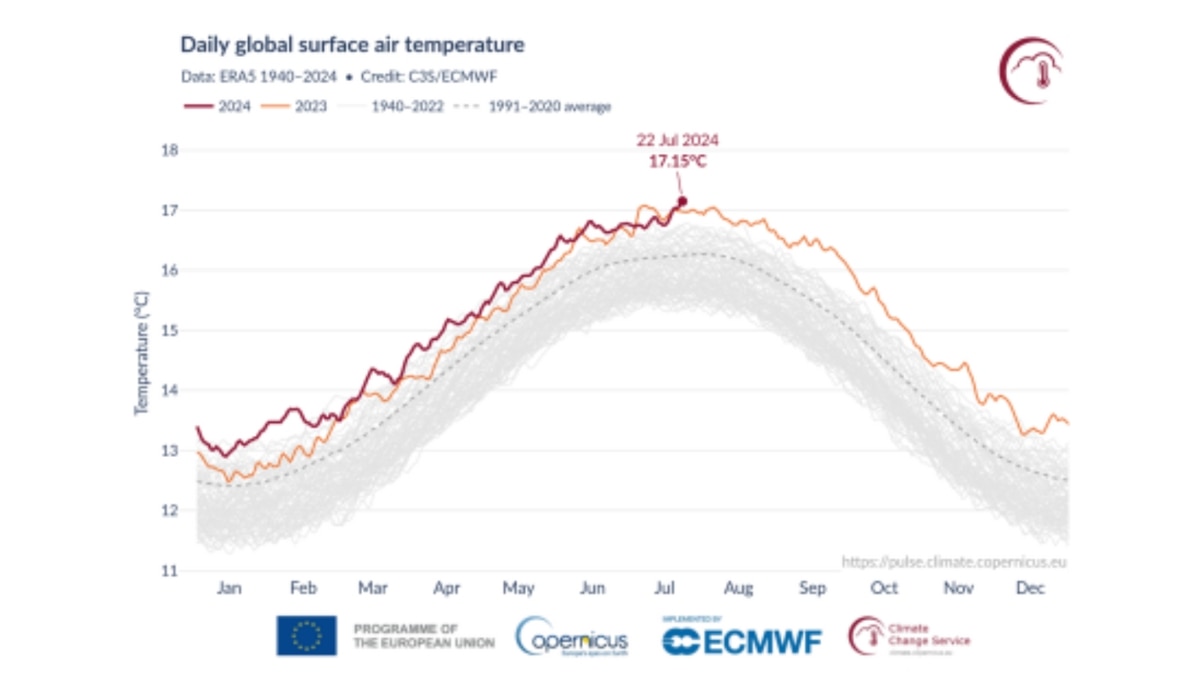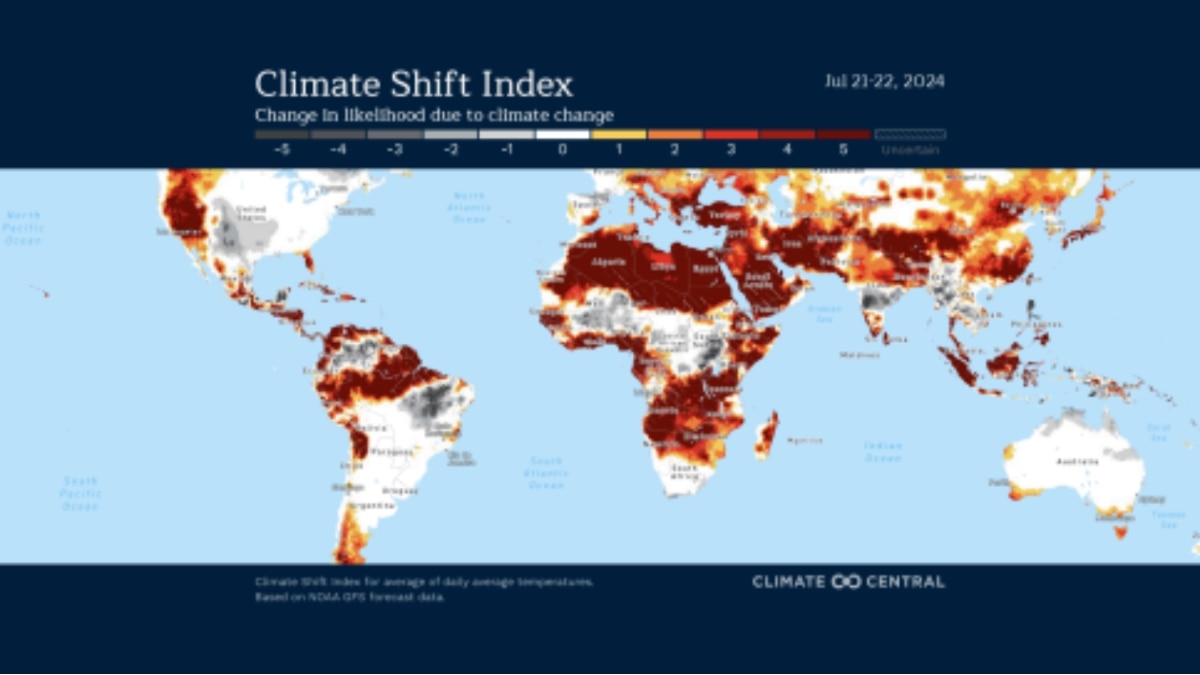July 22, 2024, Was Hottest Day On Record, NASA Report Matches Copernicus Analysis
Hottest Day On Record: In India and Pakistan, heat combined with high humidity resulted in life-threatening conditions, causing numerous heatstroke cases and at least 110 heat-related deaths.

Hottest Day In History: NASA's latest analysis of global daily temperature data reveals that July 22, 2024, was the hottest day ever recorded. The days immediately preceding and following it, July 21 and 23, also shattered the previous daily temperature record, set in July 2023. These unprecedented temperatures highlight a long-term warming trend caused by human activities, notably the release of greenhouse gases into the atmosphere.
“In a year that has been the hottest on record to date, these past two weeks have been particularly brutal,” said NASA Administrator Bill Nelson. “Through our over two dozen Earth-observing satellites and over 60 years of data, NASA is providing critical analyses of how our planet is changing and how local communities can prepare, adapt, and stay safe. We are proud to be part of the Biden-Harris Administration efforts to protect communities from extreme heat.”
This initial conclusion comes from analyses using the Modern-Era Retrospective analysis for Research and Applications, Version 2 (MERRA-2), and the Goddard Earth Observing System Forward Processing (GEOS-FP) systems. These systems amalgamate millions of global observations from land, sea, air, and satellite instruments, processed through sophisticated atmospheric models. The GEOS-FP system provides rapid, near-real-time weather data, while MERRA-2's climate reanalysis, though slower, ensures the highest quality observations.
Both these models are managed by the Global Modeling and Assimilation Office (GMAO) at the Goddard Space Flight Center of NASA in Greenbelt, Maryland.

In the heatmap shown in the above image, the daily global average temperature values from MERRA-2 for the years 1980-2022 are displayed in white, values for 2023 are shown in pink, and values from 2024 through June are shown in red. Global temperature data from July 1 to 23, 2024, collected by GEOS-FP, are shown in purple.
These results are consistent with an independent analysis (see image below) from the European Union’s Copernicus Earth Observation Programme, with both analyses highlighting a stark increase in temperatures and the occurrence of the hottest days.

Additionally, NASA's Goddard Institute for Space Studies (GISS) in New York has documented 13 straight months of record-breaking temperatures. Their research, based on the GISTEMP record, utilizes surface instrumental data to provide a comprehensive view of global temperature changes on a monthly and annual basis, extending back to the late 19th century.
FACT CHECK | 2024 Is Not Hotter Than 2020 Because Of The Sun Nearing A Solar Maximum
Copernicus Report On Hot July
The NASA report on record-breaking heat comes days after an independent analysis by the Copernicus Earth Observation Programme called July 22 the hottest day in recorded history.
The impacts of this extreme heat are being felt worldwide.
In Japan, over 200 locations faced record-breaking heat, with temperatures as high as 37°C. Indonesia and China also experienced unprecedented temperatures, leading to suspended production in some areas.
In India and Pakistan, heat combined with high humidity resulted in life-threatening conditions, causing numerous heatstroke cases and at least 110 heat-related deaths.
Gulf countries experienced heat indexes exceeding 60°C, with nighttime temperatures remaining above 30°C in several regions, leading to increased electricity demand and temporary blackouts.
In Europe, temperatures exceeded 45°C in some areas, and Morocco and Algeria saw temperatures near 50°C.
Several cities in southern and eastern Europe faced red alerts due to heat and wildfires.
Record wildfires were also reported in Pantanal, the world’s largest wetland, and in California, where large fires forced evacuations.

Scientific Consensus
Global temperatures, the Copernicus report noted, are now the highest in nearly 125,000 years. While it is not certain that July 22, which was the hottest day in recorded history, was the hottest day throughout these 1.25 lakh years, scientists are unanimous that average temperatures have not been this high ever.
They blame it on the climate change caused by deforestation and burning of fossil fuel.
Dr Joyce Kimutai, a climate scientist at Imperial College London, emphasised the urgent need to address the root causes of climate change: “This is exactly what climate science told us would happen if the world continued burning coal, oil, and gas. And it will continue getting hotter until we stop burning fossil fuels and reach net zero emissions,” she said in a statement.
Christiana Figueres, former head of UN climate negotiations and co-founder of Climate Optimism, batted for changes in related policies: “The much-used term ‘unprecedented’ no longer describes the horrific temperatures we are experiencing. G20 nations are confronted with a dangerous reality they must decisively address with policies to accelerate the deployment of renewables and the prudent phase-out of fossil fuels.”
Noting the significance of these records, Dr Karsten Haustein, a climate scientist at Leipzig University, said in a statement: “While daily temperature records should be taken with a grain of salt, this past Monday might have set a new global record for the warmest absolute global average temperature ever, going back tens of thousands of years.”
Dr Akshay Deoras, a research scientist at the National Centre for Atmospheric Science, highlighted the broader pattern: “Anthropogenic climate change is intensifying meteorological and hydrological extremes on our planet. This is leading to the frequent breaking of weather records. Unless we limit global warming by rapidly cutting the emission of greenhouse gases, weather records will continue to break frequently.”
The scientific consensus unequivocally indicates that human activity is the main cause of global warming.
Major fossil fuel companies are facing increasing scrutiny and legal action for their role in causing climate change and allegedly misleading consumers about it. The Intergovernmental Panel on Climate Change (IPCC) has confirmed that human activity is responsible for all the warming experienced since the mid-19th century.





































